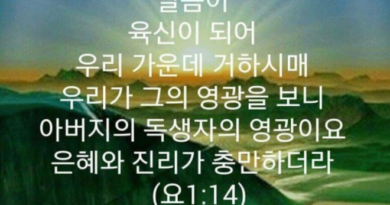남 말하기 좋아하는 자에게 재앙 있으라!
“고대 그리스에서 소크라테스는 지혜로 큰 명성을 얻었습니다. 어느 날 누군가가 위대한 철학자를 찾아와서 말했습니다.
“내가 방금 네 친구에 대해 무슨 말을 들은 줄 알아?”
“잠시만요.” 소크라테스가 대답했다. “말하기 전에
세 개의 걸러내는 체로 시험해 보고 싶습니다.”
“걸러는 체 세 개요?”
“그렇습니다.”
소크라테스는 계속 말했습니다.
“다른 사람에 대해 말하기 전에, 당신이 의미하는
바를 필터링하는 시간을 갖는 것이 중요합니다.
나는 이것을 세 가지 체로 걸러내는 테스트라 부릅니다.
첫 번째 체는 진실(TRUTH)입니다.
당신이 나에게 말할 내용이 사실인지 확인하셨습니까?”
“아니요, 방금 들었어요.”
“좋아요! 그러면 그게 사실인지는 알 수 없겠죠.
두 번째 체인 친절(KINDNESS)로 넘어가겠는데
제 친구에 관해 저에게 전하고 싶은 말이 좋은 것인가요?”
“아닌 데요! 그 반대요.”
“그래서, 당신은 나에게 그 사람에 대해 부정적인
점을 말하고자 하는데 그것이 사실인지조차
확신할 수 없네요. 당신은 세 번째 체인 유익(UTILITY)한가 하는 테스트를 통과할 수
있을 것인지 살펴봅시다. 이 친구에 대해
말하고자하는 내용이 나에게 무슨 덕이 있을까요?
“덕이 되는 것은 없어요.”
“그러므로 당신이 나에게 말하려는 것은 진실도,
좋은 것도, 유익하지도 않습니다. 그렇다면 왜
나에게 이것을 말하고 싶었습니까?”
“가십은 나쁜 것입니다.
처음에는 즐겁고 재미있어 보일지 모르지만
결국에는 우리 마음을 괴로움으로 우리를 독살시킬겁니다.”
-교황 프란치스코-
“In Ancient Greece, Socrates had a great reputation for wisdom. One day, someone came to find the great philosopher and said to him:
“Do you know what I just heard about your friend?”
“A moment,” replied Socrates. “Before you tell me, I would like to test it with the three sieves.”
“The three sieves?”
“Yes,” continued Socrates. “Before you speak about others, it’s important to take the time to filter what you mean. I call it the test of the three sieves. The first sieve is TRUTH. Have you checked if what you’re going to tell me is true?”
“No, I just heard it.”
“Very well! So, you don’t know if it’s true. Let’s move on to the second sieve, that of KINDNESS. Is what you want to tell me about my friend something good?”
“Oh, no! On the contrary.”
“So,” questioned Socrates, “you want to tell me something negative about him, and you’re not even sure it’s true? Perhaps you can still pass the test of the third sieve, that of UTILITY. Is it useful for me to know what you’re going to tell me about this friend?”
“No, not really.”
“Therefore,” concluded Socrates, “what you were going to tell me is neither true, nor good, nor useful. Why, then, did you want to tell me this?”
“Gossip is a bad thing. Initially, it may seem enjoyable and fun, but ultimately, it fills our hearts with bitterness and poisons us.””
-Pope Francis-




